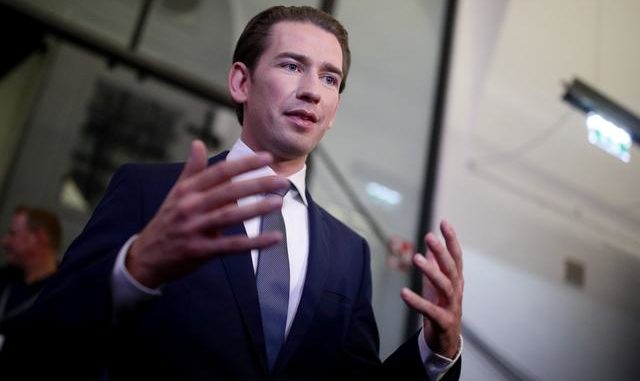
Austrian conservative leader Sebastian Kurz basked in election victory on Monday, his People’s Party (OVP) strengthened by a parliamentary contest that punished the scandal-hit far right, although tough talks lie ahead on forming a ruling coalition.Top candidate of Peoples Party (OeVP) and former Chancellor Sebastian Kurz speaks to the media prior to the TV discussion after the announcement of Austria’s snap parliamentary election at the Hofburg palace in Vienna, Austria September 29, 2019. REUTERS/Lisi Niesner
Sunday’s snap vote followed the collapse in May of Kurz’s coalition with the right-wing Freedom Party (FPO) after a video sting that forced FPO Vice Chancellor Heinz-Christian Strache to step down.
Kurz, 33, emerged largely unscathed from the uproar, with the OVP having its widest lead over the second-place Social Democrats in the post-war era. He now faces tortuous negotiations to choose one or two partners with which to govern.
His most likely coalition choices are to ally with the resurgent Greens, possibly in a three-way tie-up with the liberal Neos, or link up again with the FPO.
RELATED COVERAGE
But FPO leader Norbert Hofer called chances of a renewed alliance “very unlikely” given its poor showing on Sunday.
Austrian voters’ top concern is the environment, surveys show, which helped lift the Greens to a record 14% of the vote from less than 4% in 2017, when they crashed out of parliament.
A coalition with the Social Democrats is mathematically possible but unlikely under their current leadership.
Kurz is keeping his cards close to the chest, reiterating his mantra that he would talk to all other parties in parliament to seek a stable coalition.
ADVERTISEMENT
In an interview with broadcaster ORF aired on Monday, he said his priorities included fostering economic growth at a time of trade and political jitters.
“We are just now seeing very negative economic developments in Germany, we have not solved Brexit, we have tensions in trade ties with the United States,” he said.
“The challenge for us will be securing good economic growth in the future as well and doing our utmost to keep unemployment in Austria from rising again. This is going to be a challenging phase.”
Kurz’s OVP came a comfortable first, with 37.1% of the vote, according to a projection by pollster SORA for ORF based on a count of all but postal ballots.
The Social Democrats came second with 21.7%, their worst result since World War Two but still well ahead of the FPO on 16.1%. The projection had a margin of error of 0.7 percentage point.
While the Greens could give Kurz a narrow majority, his party is wary of being at the mercy of a handful of its left-wing lawmakers. If he does ally with the Greens he might therefore seek a three-way deal including the liberal, pro-business Neos, who are on 7.8%.
It could take time for the Greens and Kurz to convince their supporters about working together. Many Greens voters see Kurz as their enemy since he brought the far right to power. Many of Kurz’s core voters, such as farmers and big business, are wary of the Greens.
Reporting by Michael Shields, Editing by William Maclean
VIENNA (Reuters) –
